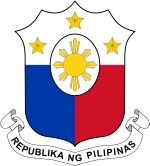Great Seal of the Philippines
| Coat of arms of the Philippines Eskudo ng Pilipinas Sagisag ng Pilipinas |
|
|---|---|
 |
|
| Versions | |

Version with the colonial charges removed,
as passed by Congress in 1998. It remains unofficial as no referendum has been called. |
|
| Details | |
| Armiger | Republic of the Philippines |
| Adopted | 3 July 1946 |
| Escutcheon | Paleways of two (2) pieces, azure and gules; a chief argent studded with three (3) mullets equidistant from each other; and, in point of honour, ovoid argent over all the sun rayonnant with eight minor and lesser rays |
| Compartment | Beneath shall be the scroll with the Name of the Country in Filipino inscribed thereon |
| Motto | Republika ng Pilipinas |
| Other elements | Bald eagle of the United States and lion rampant of Spain (the charge of Kingdom of León) |
The Coat of Arms of the Philippines (Filipino: Eskudo ng Pilipinas or Sagisag ng Pilipinas) features the eight-rayed sun of the Philippines with each ray representing the eight provinces (Batangas, Bulacan, Cavite, Manila, Laguna, Nueva Ecija, Pampanga and Tarlac) which were placed under martial law by Governor-General Ramón Blanco during the Philippine Revolution, and the three five-pointed stars representing the three primary geographic regions of Luzon, Visayas, and Mindanao.
On the blue field on the dexter side is the American bald eagle of the United States, and on the red field on the sinister side is the lion rampant of the coat of arms of the Kingdom of León, both representing the country's colonial past. The current arms, which shares many features of the national flag, was designed by Filipino artist and heraldist Captain Galo B. Ocampo.
The blazon of the coat of arms from Flag and Heraldic Code of the Philippines (Republic Act 8491) is as follows:
...
Wikipedia
